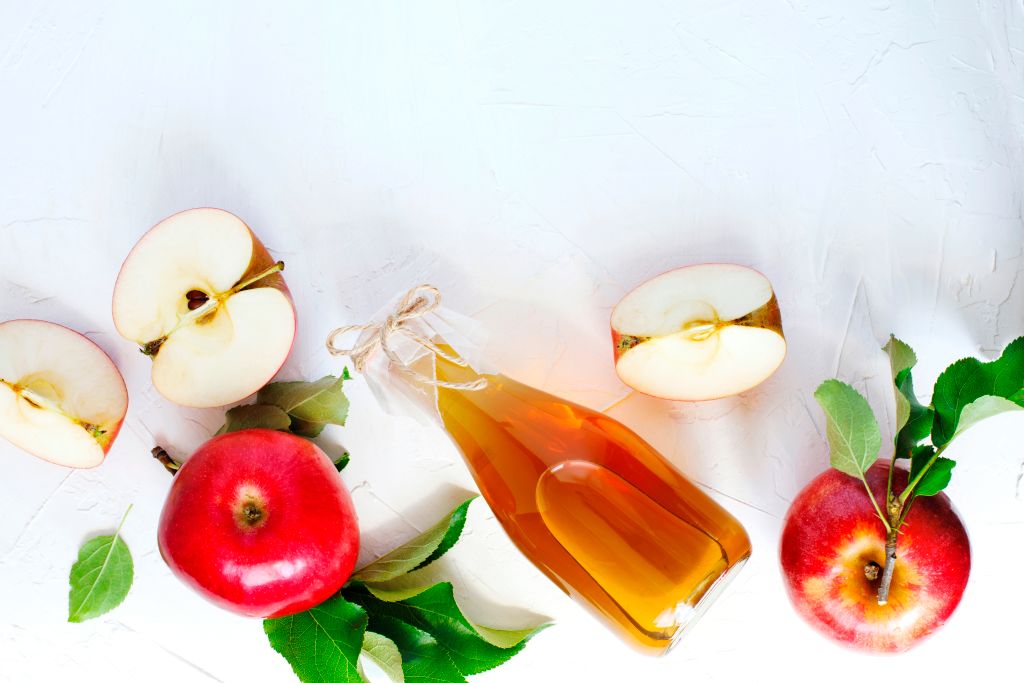Cleaning experts explain if you can use apple cider vinegar to clean
Want a more natural cleaning option? Apple cider vinegar may be a possible alternative to harsher products, but there are a few things to know before using it


Apple cider vinegar can be a powerful and natural cleaning solution that solves some of your most tough-to-tackle problems – but there are some pros, cons, and facts about using it that you should know prior to getting to work.
Most of us know that cleaning with vinegar can be an effective tool in your house cleaning arsenal, but what makes apple cider vinegar so special?
We asked cleaning experts for all the best tips and tricks to help you make the most of cleaning with apple cider vinegar, as well as some alternatives.
Can I use apple cider vinegar to clean?
Yes, you can clean with apple cider vinegar, and it's a good alternative to chemical cleaners, plus you can buy apple cider vinegar by the gallon from Amazon, pretty cheaply.
Itamar Dor, founder of the Green Life blog says: 'When it comes to cleaning our homes, many of us seek out natural and eco-friendly alternatives to harsh chemical cleaners. Known for its various health benefits, apple cider vinegar has found its way into the realm of cleaning.'
Apple cider vinegar can also be a nicer cleaning alternative to brown vinegar due to its milder smell.
However, 'while apple cider vinegar can have some antibacterial properties, it may not be as effective against certain pathogens compared to commercial disinfectants. For high-risk areas like cutting boards or areas prone to bacteria buildup, it's recommended to use stronger disinfectants or consider alternatives like hydrogen peroxide or tea tree oil,' continues Itamar Dor.
He continues: 'Apple cider vinegar is acidic, which means it may not be suitable for certain surfaces. Avoid using it on natural stone countertops, marble, or grout, as it can cause etching or discoloration. Always perform a patch test in an inconspicuous area before using apple cider vinegar on any surface.'
Also in general, white vinegar – also on sale at Amazon by the gallon – is a better option than using apple cider vinegar due to its higher acidity level – apple cider vinegar contains five to six percent acetic acid, whereas white vinegar has five to ten, meaning it will be a quicker and deeper clean.
Below, we go through all the places you can use apple cider vinegar to clean, and when to use something else.
Why use apple cider vinegar to clean?
Muffetta Krueger, cleaning expert and founder of Muffetta’s Domestic Assistants says, 'Cleaning with apple cider vinegar can be an excellent idea due to its numerous properties. Apple cider vinegar is a mild acid with antibacterial and antifungal properties, making it effective against many common household germs. It is non-toxic, environmentally friendly, and often more affordable than commercial cleaning products. However, there are some considerations to keep in mind when using apple cider vinegar for cleaning purposes.'
Ryan Knoll, cleaning expert and owner of Tidy Casa adds, 'Apple cider vinegar is a powerful tool in home cleaning due to its acetic acid content, which gives it antimicrobial properties. It's a non-toxic and eco-friendly cleaning solution, making it a fantastic option for those with allergies, pets, or young children.'
'Apple cider vinegar is also a great deodorizer for items such as carpets, upholstery, and refrigerator shelves', advises Nathaly Vieira, professional cleaner and founder of Inspire Clean.
The best news? You don't have to go to specialist stores for it: you can buy Great Value Apple Cider Vinegar at Walmart.

Muffetta Krueger is a cleaning expert and founder of Muffetta’s Domestic with over 16 years of operational management experience in the service industry. Muffetta’s Domestic Assistants provides housekeepers, house cleaners and maids, and is based in New York.
Ryan Knoll is a cleaning expert and owner of Tidy Casa, a cleaning and maid service with bases in Phoenix, Scottsdale, Mesa, Chandler, Tempe, and Tucson. Ryan has been featured on Local Service Business Podcast, talking about systems, growth, and his automated business.

Nathaly Vieira is a professional cleaner and founder of Inspire Clean, a cleaning company full of cleaning tips and advice. Based in the US, the company aims to reach people in the Niagara region, Hamilton, Burlington, Oakville, Milton, Mississauga, Guelph, and Kitchener-Waterloo.
When to clean with apple cider vinegar
In the kitchen
Where apple cider vinegar is most effective, suggests John Larson, cleaning expert and blogger, is in the kitchen, 'Apple cider vinegar can effectively clean kitchen countertops, cutting boards, and stainless steel appliances. It can also be used to remove mineral deposits from faucets and other fixtures.'
'Wipe down your refrigerator, oven, and other kitchen appliances with a cloth dampened in a mixture of apple cider vinegar and water to remove grease and grime effectively,' says Muffetta Krueger, cleaning expert and founder of Muffetta’s Domestic Assistants.
In the bathroom
'The acidic properties of apple cider vinegar make it useful for cleaning bathroom surfaces, such as sinks, bathtubs, and tiles. It can help combat soap scum and hard water stains', continues John.
Ryan Knoll, Owner of Tidy Casa suggests, 'Mixed with baking soda, it can unclog and deodorize drains. It's excellent for dealing with mold in bathrooms and other damp areas. It can bring a shine to stainless steel appliances and fixtures.'
On glass
Ryan adds that you can clean mirrors without streaks by diluting apple cider vinegar in water. The streak-free solution also works for cleaning windows.
On floors
'Mix a cup of apple cider vinegar with warm water to mop and disinfect your floors. It works well on laminate and tile floors,' continues Muffetta Krueger.

John Larson is a Miami-based cleaning and tools expert at Best Cleaning Tools. His insightful blogs on cleaning troubleshooting provide practical tips and innovative solutions. With extensive hands-on experience and a passion for cleanliness, John offers expert advice to help individuals achieve pristine spaces efficiently.
Where to be cautious cleaning with apple cider vinegar
On natural materials
There are some things not to clean with vinegar to save a whole lot of heartache. Ryan Knoll advises, 'Apple cider vinegar's acidic nature makes it unsuitable for specific surfaces, like hardwood floors or natural stone countertops, as it can cause damage over time.'
Muffetta Krueger, cleaning expert and founder of Muffetta’s Domestic Assistants agrees: 'Be cautious when using it on marble or granite surfaces as the acidity may cause damage over time. Instead, opt for a pH-neutral cleaner specifically designed for stone surfaces.'
Nathaly Vieira, professional cleaner and founder of Inspire Clean adds, 'I would warn that it is not a “one-size fits all” solution for cleaning and disinfecting. I would prefer to avoid using it on natural stones such as marble or granite and advise using it diluted with water when cleaning surfaces like wood. Apple cider vinegar is acidic, so it can cause damage if used on some materials. It is always best to test a small area first, before using it more liberally.'
On porous materials
'Similarly, it isn't recommended for use on porous materials or delicate fabrics as it can cause discoloration,' continues Ryan Knoll.
On carpet
Muffetta adds, 'For carpet stains, apple cider vinegar may not be the best option. Instead, try a carpet cleaner designed for stain removal.'
On precious metals
'Apple cider vinegar may tarnish silver and damage certain types of jewelry. Use appropriate silver polish or consult a jeweler for cleaning instructions,' concludes Muffetta.
How to use apple cider vinegar to clean
Is it the right cleaning product?
John Larson, cleaning expert and blogger at Best Cleaning Tools, recommends, 'Apple cider vinegar may not be as potent as commercial disinfectants, so it's essential to consider the specific cleaning requirements and desired level of disinfection.'
We would add: always test a small part of your surface first, in case of damage.
Vacuum first
Nathaly Vieira, professional cleaner and founder of Inspire Clean suggests, 'For tougher jobs, I would suggest removing dirt or debris first with a vacuum cleaner or broom before using apple cider vinegar. It can be helpful for getting rid of dirt, grime and grease, but it isn’t a substitute for heavy-duty cleaning products.'
Dilute with water
When using apple cider vinegar as an all-purpose cleaner, John says: 'Mix equal parts apple cider vinegar and water in a spray bottle. You can use this solution to clean counters, floors, appliances, mirrors, windows and more. For tougher stains, you can use a stronger solution of 3 parts vinegar to 1 part water.'
Add a scent
'To make the most out of apple cider vinegar as a cleaner, I recommend adding essential oils to make it more effective,' continues Nathaly Viera. 'Adding a few drops of your favorite scent will give the vinegar an extra boost and make it more pleasant to clean with.'
'Add a teaspoon of lemon juice to the mixture to help freshen the smell,' suggests Matthew Baratta, VP of Operations at Daimer Industries.
Allow to soak then scrub and rinse
'To remove hard water stains, apply undiluted apple cider vinegar to hard water stains on faucets, showerheads, and other hard surfaces. Let the vinegar sit for a few minutes, then scrub with a sponge or cloth,' continues John.
'To clean drains, pour a cup of apple cider vinegar down the drain and let it sit for 30 minutes. Then, flush the drain with hot water.
'To remove mildew, mix equal parts apple cider vinegar and water in a spray bottle. Spray the solution on mildew-affected areas and let it sit for 30 minutes. Then, scrub with a sponge or cloth and rinse with water.

Matthew Baratta is VP of Operations at Daimer Industries, an advanced eCommerce commercial and industrial cleaning equipment company based in North America. Matthew has extensive knowledge in the cleaning industry and has a Master of Public Health in Bioethics and Health Law.
FAQs
What can be used as an alternative to apple cider vinegar?
Ryan Knoll suggests, 'White vinegar can often be used as an eco-friendly alternative instead of apple cider vinegar, as it has similar properties but is cheaper with less of a smell.'
Itamar Dor recommends, 'Cleaning with baking soda: This common household ingredient is a powerhouse when it comes to tackling tough stains, deodorizing carpets, and scrubbing surfaces. Mixing baking soda with water or vinegar creates a potent and natural cleaning paste.'
John Larson also advises 'Borax is a natural mineral that is effective at removing dirt, grease, and stains.' Milliard Borax Powder, at Walmart can be used as a multipurpose cleaning agent.
'Dish soap is a good all-purpose cleaner that can be used to clean a variety of surfaces.
'Bleach is a powerful cleaner that should only be used on non-porous surfaces.' We recommend this Clorox Clean-Up All Purpose Cleaner with Bleach, from Walmart, in a spray bottle to make cleaning that bit easier!
'Lemon juice contains citric acid, making it a natural cleaner and deodorizer. It can be used on various surfaces and leaves behind a pleasant scent.
'Baking soda is an excellent option for tackling tough stains, removing odors, and acting as a gentle abrasive for scrubbing.
'When choosing a cleaner, it is important to consider the type of surface you are cleaning and the severity of the dirt or grime. If you are unsure about which cleaner to use, it is always best to consult a cleaning expert.'
Matthew Baratta, VP of Operations at Daimer Industries recommends, 'For cleaning dirtier surfaces such as the oven, the vinegar-based solution is also safe; however, you may find the grime harder to penetrate vinegar alone. I suggest using a stronger active ingredient, such as baking soda or hydrogen peroxide. Either apply baking soda to the entire area and then spray water and let it sit, or create a paste with baking soda, water, and two teaspoons of hydrogen peroxide and use a sponge to scrub it on the oven.' We suggest this heritage store Hydrogen Peroxide, at Walmart.
'Apple cider vinegar can be a valuable addition to your cleaning routine, thanks to its versatility and mild acidic properties. It works well as an all-purpose cleaner and odor-neutralizer. However, it's important to be cautious with its use on certain surfaces and understand its limitations as a disinfectant,' says Itamar Dor, founder of the Green Life blog.
So while this household product is an effective and natural product for your cleaning needs, you should first consider how you are using it and where, and if it could cause some damage to your surface.
Sign up to the Homes & Gardens newsletter
Design expertise in your inbox – from inspiring decorating ideas and beautiful celebrity homes to practical gardening advice and shopping round-ups.

Lola Houlton is a news writer for Homes & Gardens. She has been writing content for Future PLC for the past six years, in particular Homes & Gardens, Real Homes and GardeningEtc. She writes on a broad range of subjects, including practical household advice, recipe articles, and product reviews, working closely with experts in their fields to cover everything from heating to home organization through to house plants. Lola is a graduate, who completed her degree in Psychology at the University of Sussex. She has also spent some time working at the BBC.
-
 Roasted radishes and scallions
Roasted radishes and scallionsAn easy, elegant side that brings out the softer, sweeter side of spring vegetables, it's the perfect addition to your spring table
By Alice Hart
-
 Raw cauliflower, pea and herb salad
Raw cauliflower, pea and herb saladFresh, zesty, and full of texture, this wholesome cauliflower recipe is a vibrant addition to any spring menu. Here's how to make it
By Alice Hart